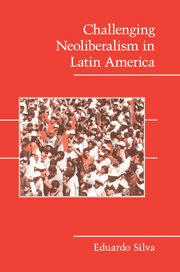Crossref Citations
This Book has been
cited by the following publications. This list is generated based on data provided by Crossref.
Almeida, Paul D
2010.
Handbook of Politics.
p.
305.
Heine, Jorge
2010.
Inter-American Cooperation at a Crossroads.
p.
225.
2010.
Publications Received.
Contemporary Sociology: A Journal of Reviews,
Vol. 39,
Issue. 6,
p.
766.
Kröger, Markus
2011.
Promotion of contentious agency as a rewarding movement strategy: evidence from the MST-paper industry conflicts in Brazil.
Journal of Peasant Studies,
Vol. 38,
Issue. 2,
p.
435.
Murphy, Mary P.
2011.
Civil Society in the Shadow of the Irish State.
Irish Journal of Sociology,
Vol. 19,
Issue. 2,
p.
170.
Bellinger, Paul T.
and
Arce, Moisés
2011.
Protest and Democracy in Latin America’s Market Era.
Political Research Quarterly,
Vol. 64,
Issue. 3,
p.
688.
Bull, Benedicte
and
Bøås, Morten
2012.
Between Ruptures and Continuity: Modernisation, Dependency and the Evolution of Development Theory.
Forum for Development Studies,
Vol. 39,
Issue. 3,
p.
319.
ARSEL, MURAT
2012.
BETWEEN ‘MARX AND MARKETS’? THE STATE, THE ‘LEFT TURN’ AND NATURE IN ECUADOR.
Tijdschrift voor Economische en Sociale Geografie,
Vol. 103,
Issue. 2,
p.
150.
Arsel, Murat
and
Angel, Natalia Avila
2012.
“Stating” Nature’s Role in Ecuadorian Development.
Journal of Developing Societies,
Vol. 28,
Issue. 2,
p.
203.
Mauersberger, Christof
2012.
To be prepared when the time has come: Argentina’s new media regulation and the social movement for democratizing broadcasting.
Media, Culture & Society,
Vol. 34,
Issue. 5,
p.
588.
Cameron, Maxwell A.
Hershberg, Eric
and
Sharpe, Kenneth E.
2012.
New Institutions for Participatory Democracy in Latin America.
p.
1.
Doyle, David
2012.
Pressures to Privatize? The IMF, Globalization, and Partisanship in Latin America.
Political Research Quarterly,
Vol. 65,
Issue. 3,
p.
572.
Singh, Jewellord T. Nem
2012.
New Political Spaces in Latin American Natural Resource Governance.
p.
217.
Bair, Jennifer
and
Hough, Phillip A
2012.
The legacies of partial possession: From agrarian struggle to neoliberal restructuring in Mexico and Colombia.
International Journal of Comparative Sociology,
Vol. 53,
Issue. 5-6,
p.
345.
King, Phoebe
2013.
Social and Political Foundations of Constitutions.
p.
366.
Gürcan, Efe Can
2013.
Hugo Chávez’s unwritten testament: national-democratic struggle and contradictions of socialism.
Dialectical Anthropology,
Vol. 37,
Issue. 3-4,
p.
341.
Arce, Moisés
and
Mangonnet, Jorge
2013.
Competitiveness, Partisanship, and Subnational Protest in Argentina.
Comparative Political Studies,
Vol. 46,
Issue. 8,
p.
895.
Mendoza-Botelho, Martín
2013.
Social Capital and Institutional Trust: Evidence from Bolivia's Popular Participation Decentralisation Reforms.
Journal of Development Studies,
Vol. 49,
Issue. 9,
p.
1219.
Horton, Lynn R.
2013.
From Collectivism to Capitalism: Neoliberalism and Rural Mobilization in Nicaragua.
Latin American Politics and Society,
Vol. 55,
Issue. 1,
p.
119.
Roberts, Kenneth M.
2013.
Market Reform, Programmatic (De)alignment, and Party System Stability in Latin America.
Comparative Political Studies,
Vol. 46,
Issue. 11,
p.
1422.



